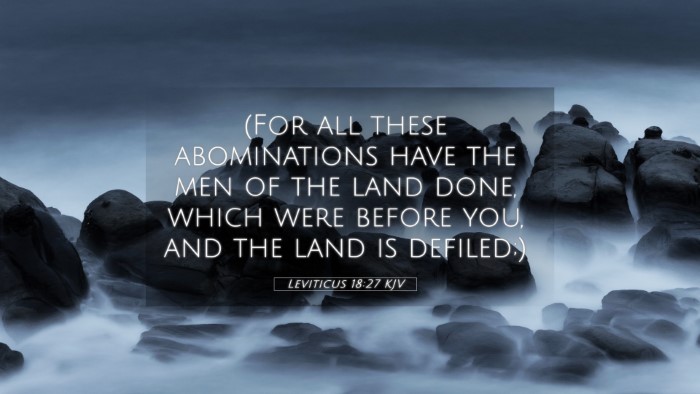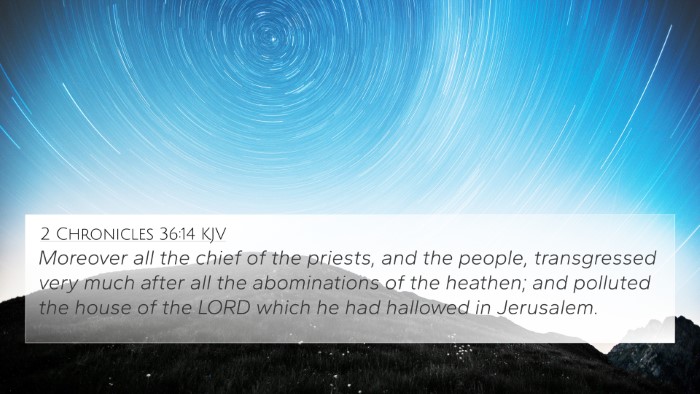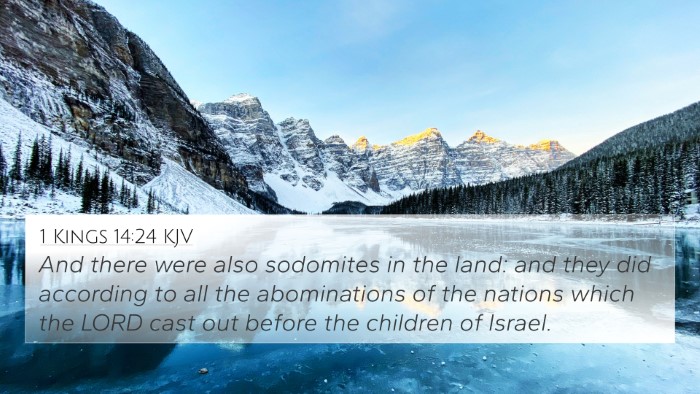Understanding Leviticus 18:27
Leviticus 18:27 states: "For all these abominations have the men of the land done, which were before you, and the land is defiled." This verse is part of a larger passage in which the Lord provides instructions to the Israelites regarding moral conduct, particularly concerning sexual relations and behaviors considered abominable.
Context and Overview
Leviticus, the third book of the Bible, chiefly addresses laws concerning holiness and purity among God's people. In this chapter, God enumerates practices that are detestable and declares the consequences of engaging in such actions. The repetition of the term "abominations" emphasizes the gravity of defilement brought upon the land by the wrongful behaviors of the nations prior to Israel's arrival.
Verse Analysis
This specific verse serves as a reminder of the consequences of sin not only on individuals but also on the broader community and the land itself. Matthew Henry, in his commentary, suggests that the moral decay exemplified by the nations surrounding Israel serves as a powerful warning. Adam Clarke adds that the term "defiled" indicates a spiritual and physical contamination resulting from these actions.
Key Themes
- The Nature of Abomination: The actions mentioned represent more than just societal disapproval; they signify a profound breach of God's moral law.
- The Consequence of Sin: As noted, sin has pervasive effects, which can damage the social fabric and affect the purity of the land inhabited by God's people.
- Holiness Required: This verse underscores the importance of holiness and strict adherence to God’s commandments, a recurring theme in Leviticus.
Bible Verse Cross-References
When interpreting Leviticus 18:27, it’s valuable to consider other relevant scriptures that provide additional context and understanding. Below are some key cross-references:
- Deuteronomy 18:9-12: Discusses abominable practices of neighboring nations.
- Ezekiel 18:30: Calls for repentance from all offenses to avoid judgment.
- Romans 1:18-32: Describes the consequences of turning away from God, paralleling the themes of defilement.
- 1 Corinthians 6:9-10: Lists behaviors that exclude individuals from the kingdom of God.
- Revelation 21:27: Declares that nothing impure will enter the heavenly city.
- Leviticus 20:22-23: Reinforces the need for the Israelites to avoid the ways of the previous inhabitants of the land.
- 2 Chronicles 33:9: Illustrates how Manasseh's sin led to the defilement of the land.
Thematic Bible Verse Connections
These verses and others highlight a broader biblical theme concerning the need for purity and adherence to God's laws. They establish a dialogue across both the Old and New Testaments, presenting a consistent message about sin, its consequences, and the call to righteousness.
Practical Applications
For modern readers, Leviticus 18:27 serves as a sobering reminder of the importance of moral integrity and the collective responsibility to uphold God's commandments. This verse encourages believers to examine their lives and the cultural influences around them, promoting a pursuit of holiness in thought and action.
Tools for Bible Cross-Referencing
Utilizing tools such as a Bible concordance, a Bible cross-reference guide, or engaging in cross-reference Bible study can greatly enhance one's understanding of scripture. These resources help identify connections between biblical texts and support deeper thematic studies of the scriptures.
Conclusion
Understanding Leviticus 18:27 through the lens of additional scriptural insights and thematic connections enriches a believer’s perspective on God’s expectations for holiness. The interconnectedness of the Bible offers profound wisdom as believers navigate moral challenges today. Such scriptural cross-referencing provides a vital resource for comprehensive Bible study and prepares individuals for more profound engagement with the text.














